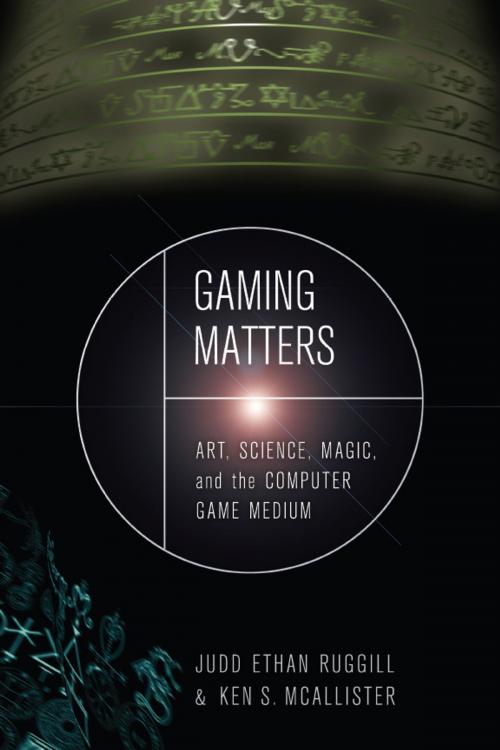Gaming Matters
Art, Science, Magic, and the Computer Game Medium
Nonfiction, Entertainment, Games, Video & Electronic, Computers, Entertainment & Games, Video & Electronic Games| Author: | Judd Ethan Ruggill, Ken S. McAllister | ISBN: | 9780817385590 |
| Publisher: | University of Alabama Press | Publication: | May 11, 2011 |
| Imprint: | University Alabama Press | Language: | English |
| Author: | Judd Ethan Ruggill, Ken S. McAllister |
| ISBN: | 9780817385590 |
| Publisher: | University of Alabama Press |
| Publication: | May 11, 2011 |
| Imprint: | University Alabama Press |
| Language: | English |
Normal0falsefalsefalseMicrosoftInternetExplorer4
In his 2004 book Game Work, Ken S. McAllister proposed a rigorous critical methodology for the discussion of the “video game complex”—the games themselves, their players, the industry that produces them, and those who review and market them. Games, McAllister demonstrated, are viewed and discussed very differently by different factions: as an economic force, as narrative texts, as a facet of popular culture, as a psychological playground, as an ethical and moral force, even as a tool for military training.
In Gaming Matters, McAllister and coauthor Judd Ruggill turn from the broader discussion of video game rhetoric to study the video game itself as a medium and the specific features that give rise to games as similar and yet diverse as Pong, Tomb Raider, and Halo. In short, what defines the computer game itself as a medium distinct from all others? Each chapter takes up a different fundamental characteristic of the medium. Games are:
• Idiosyncratic, and thus difficult to apprehend using the traditional tools of media study
• Irreconcilable, or complex to such a degree that developers, players, and scholars have contradictory ways of describing them
• Boring, and therefore obligated to constantly make demands
on players’ attention
• Anachronistic, or built on age-old tropes and forms of play
while ironically bound to the most advanced technologies
• Duplicitous, or dependent on truth-telling rhetoric even when they are about fictions, fantasies, or lies
• Work, or are often better understood as labor rather than play
• Alchemical, despite seeming all-too mechanical or predictable
Video games are now inarguably a major site of worldwide cultural production.
Gaming Matters will neither flatter game enthusiasts nor embolden game detractors in their assessments. But it will provide a vocabulary through which games can be discussed in academic settings and will create an important foundation for future academic discourse.
Normal0falsefalsefalseMicrosoftInternetExplorer4
In his 2004 book Game Work, Ken S. McAllister proposed a rigorous critical methodology for the discussion of the “video game complex”—the games themselves, their players, the industry that produces them, and those who review and market them. Games, McAllister demonstrated, are viewed and discussed very differently by different factions: as an economic force, as narrative texts, as a facet of popular culture, as a psychological playground, as an ethical and moral force, even as a tool for military training.
In Gaming Matters, McAllister and coauthor Judd Ruggill turn from the broader discussion of video game rhetoric to study the video game itself as a medium and the specific features that give rise to games as similar and yet diverse as Pong, Tomb Raider, and Halo. In short, what defines the computer game itself as a medium distinct from all others? Each chapter takes up a different fundamental characteristic of the medium. Games are:
• Idiosyncratic, and thus difficult to apprehend using the traditional tools of media study
• Irreconcilable, or complex to such a degree that developers, players, and scholars have contradictory ways of describing them
• Boring, and therefore obligated to constantly make demands
on players’ attention
• Anachronistic, or built on age-old tropes and forms of play
while ironically bound to the most advanced technologies
• Duplicitous, or dependent on truth-telling rhetoric even when they are about fictions, fantasies, or lies
• Work, or are often better understood as labor rather than play
• Alchemical, despite seeming all-too mechanical or predictable
Video games are now inarguably a major site of worldwide cultural production.
Gaming Matters will neither flatter game enthusiasts nor embolden game detractors in their assessments. But it will provide a vocabulary through which games can be discussed in academic settings and will create an important foundation for future academic discourse.















